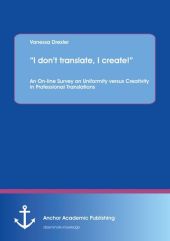 Neuerscheinungen 2016Stand: 2020-02-01 |
Schnellsuche
ISBN/Stichwort/Autor
|
Herderstraße 10
10625 Berlin
Tel.: 030 315 714 16
Fax 030 315 714 14
info@buchspektrum.de |

Vanessa Drexler
"I don´t translate, I create!" An On-line Survey on Uniformity versus Creativity in Professional Translations
2016. 128 S. 30 Abb. 270 mm
Verlag/Jahr: ANCHOR ACADEMIC PUBLISHING 2016
ISBN: 3-9548947-7-7 (3954894777)
Neue ISBN: 978-3-9548947-7-2 (9783954894772)
Preis und Lieferzeit: Bitte klicken
"I don´t translate, I create!" - This is the slogan of a translation agency called "Sternkopf Communications" located in Flöha, Germany. The translators at this translation agency are specialized in the field of marketing and perceive creativeness their daily bread. But what does this actually mean - I don´t translate, I create? Undoubtedly, the translation of a text from one language into another is not an easy and straightforward process. On the contrary, the translator needs to invest much time and one or the other headache before a target text (TT) finally sounds natural, fluent, coherent and logical for the target audience. Different possible translation solutions will have to be considered, language as well as culture-related equivalents often are not easily at hand etc. Would it not be pleasant if machine translation (MT) was there to help with this process?
Nevertheless, as promising as this may sound, no machine or software developed so far is able to independently produce TTs meeting the standards of marketable translations, despite copious efforts to do so. This just goes to show how important the human capacity of creativity in language and text production is for the translation process. Without human creative thinking, TTs would, in fact, truly only read like translations, i.e. mechanical reproductions of the source text (ST) in a different code, rather than natural texts in their own right. Good translations, however, distinguish themselves by not revealing their readership that they are "merely" renderings of the original text. Hence, a slogan such as "I don´t translate, I create", emphasizes the effort that is put into the translation process quite well, making the customers of Sternkopf Communications instantly aware of the fact that their texts are in good hands and will eventually not read like mechanical translations but as if they were well-composed originals.
Yet, despite the enormous importance of creativity in translating, computer-aided translation (CAT) tools are being used frequently by professional translators, not to replace but to support the translator in their daily business. From the 1990s onwards, using CAT tools has been becoming increasingly popular for the following reason: They are said to help translators to achieve faster turnaround times by storing completed translations in a translation memory (TM). In so doing, CAT tools enable their users to translate in a more consistent way, since they search source texts for words, phrases or sentences that have already been translated before and stored in the TM so that the translator does not need to translate this text unit again ´from scratch´.
Accordingly, this paper pursues two related purposes. The first is to compare the different CAT tools in their degree of usability to gain an impression of which of these translation memory solutions is perceived to meet translators´ technological requirements best. The second purpose is to identify translators´ perspectives on uniformity and creativity in translations with the goal to shedding light on the question whether CAT tools generally tend to positively or negatively influence the translation process on a rather linguistic than technological basis.
Vanessa Drexler, B.A., was born in 1991 in Hof, Germany. She successfully graduated from Chemnitz University of Technology in 2013 with a bachelor´s degree in English and American Studies. During her undergraduate studies in Chemnitz, the author could already gain useful practical experiences in the translation industry through the completion of an internship at Sternkopf Communications in Flöha and her work as a research assistant at the Mechanical Engineering Faculty of the university. Fascinated by the American culture and language, she spent two semesters abroad in California in order to get to know the country and its people. Based on her interest in multi-cultural societies, translating as well as interpreting has become an integral part of her life. Currently, the author writes her master thesis on the California Vowel Shift and is planning to finish graduate school in summer 2016.


